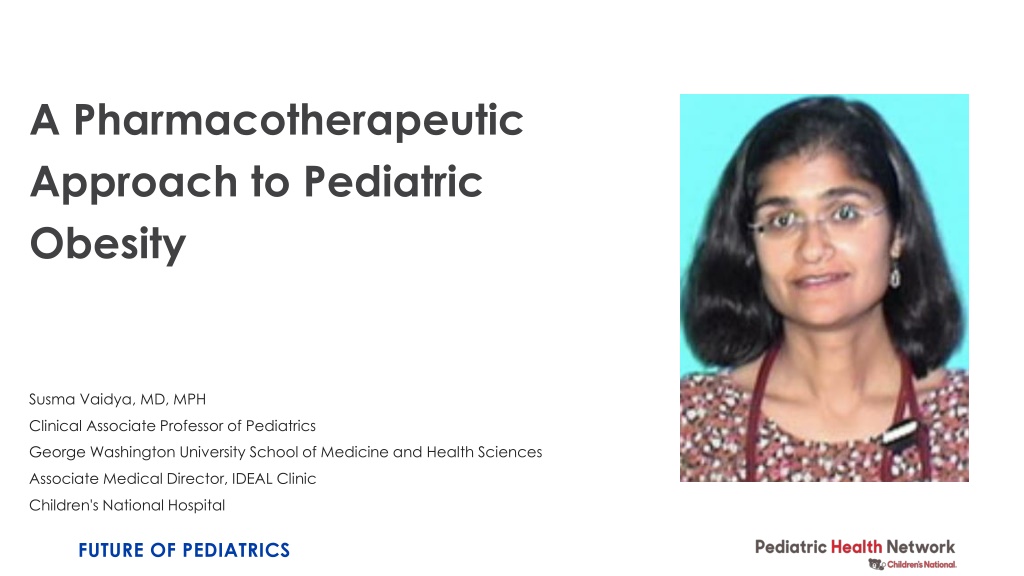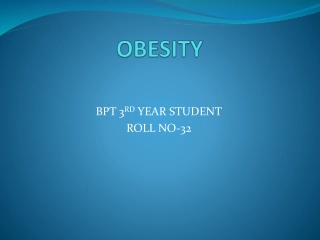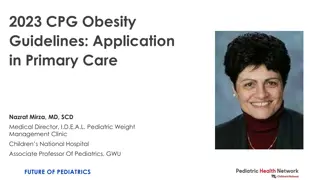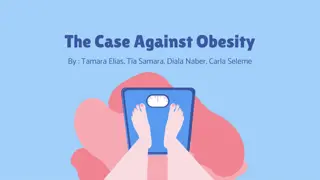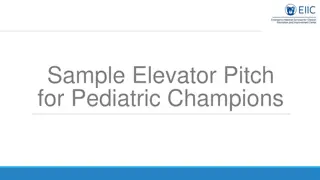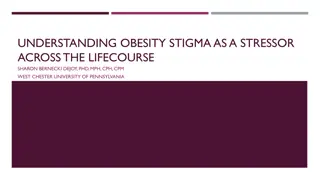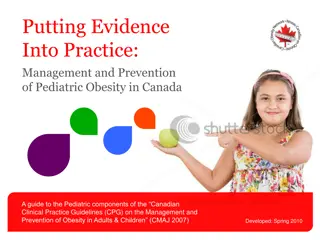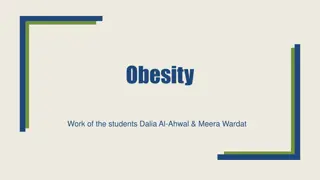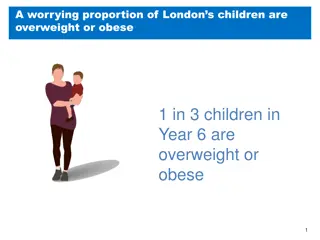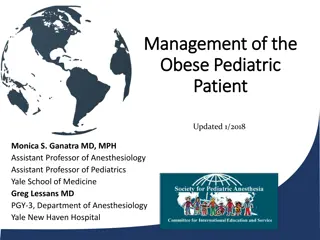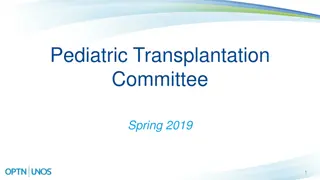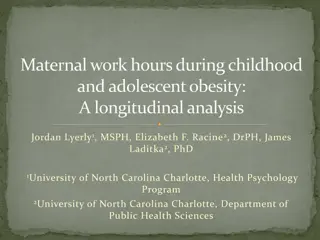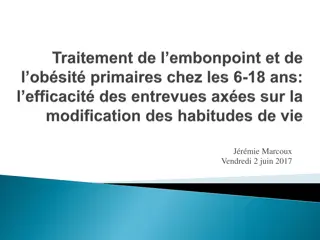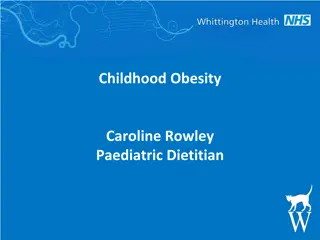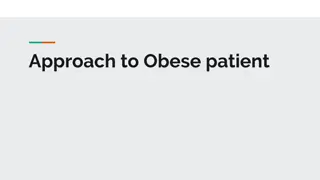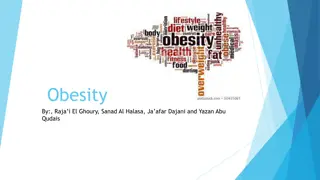A Pharmacotherapeutic Approach to Pediatric Obesity
Explore pediatric pharmacotherapeutic options for managing obesity, including off-label medication use. Review guidelines, recommendations, and the role of medication in adjunct to lifestyle interventions for children and adolescents with obesity.
Download Presentation

Please find below an Image/Link to download the presentation.
The content on the website is provided AS IS for your information and personal use only. It may not be sold, licensed, or shared on other websites without obtaining consent from the author. Download presentation by click this link. If you encounter any issues during the download, it is possible that the publisher has removed the file from their server.
E N D
Presentation Transcript
A Pharmacotherapeutic Approach to Pediatric Obesity Susma Vaidya, MD, MPH Clinical Associate Professor of Pediatrics George Washington University School of Medicine and Health Sciences Associate Medical Director, IDEAL Clinic Children's National Hospital FUTURE OF PEDIATRICS
Financial Disclosure The presenter has no financial conflicts of interest to disclose. Off-label use of medications to treat obesity where no approved/affordable alternatives exist will be discussed. FUTURE OF PEDIATRICS
Objectives Review available pharmacotherapeutic options in pediatric weight management Review data for efficacy of newer medications Review the clinical reasoning in choosing a medication Discuss a clinical scenario in pediatric obesity management FUTURE OF PEDIATRICS
AAP Clinical Practice Guidelines for the Evaluation and Treatment of Children and Adolescents with Obesity Key Action Statement 12 (Grade B) PHCPs should offer adolescents 12 y and older with obesity: Pharmacotherapy, according to medication indications, risks, and benefits, as an adjunct to health behavior & lifestyle treatment Consensus Recommendation: PHCPs may offer children ages 8 y through 11 y of age with obesity : Pharmacotherapy, according to medication indications, risks, and benefits, as an adjunct to health behavior & lifestyle treatment FUTURE OF PEDIATRICS
No current evidence supports weight loss medication use as monotherapy; thus, PHCPs who prescribe weight loss medication to children should provide or refer to intensive behavioral interventions for patients & families as an adjunct to medication therapy. -CPG FUTURE OF PEDIATRICS
Off-Label Weight Management Medications Metformin Topiramate Lisdexamfetamine FUTURE OF PEDIATRICS 6
Metformin Antidiabetic agent which increases insulin sensitivity and decreases blood glucose production FDA approved for patients 10 years of age and older with T2DM Off label uses: Prediabetes PCOS Prevention of weight gain with an atypical antipsychotic FUTURE OF PEDIATRICS
Metformin Dosing: 250 mg to 500 mg orally once to twice daily, with increase to 2000 to 2500 mg based on age and effect Needs to be taken with a meal Can change to ER once a day for better compliance Adverse effects: bloating, nausea, flatulence, diarrhea Rare side effects: lactic acidosis, hepatic toxicity BMI reduction in pediatric populations: minimal Consider as an adjunct to IHBLT when specific indications present FUTURE OF PEDIATRICS
Topiramate Unclear mechanism of appetite suppression FDA approved for 2 years of age for epilepsy and 12 years of age for headaches Off label use: Appetite suppression/weight loss Dosing: 25 mg to 100 mg daily Adverse effects: cognitive blunting, somnolence Potential teratogen: counseling and birth control needed FUTURE OF PEDIATRICS
Lisdexamfetamine Stimulant FDA approved for 6 years of age with ADHD and for binge eating in patients 18 years of age Off label use: Children and adolescents who exhibit a loss of control with food Dosing: 10 mg to 70 mg Adverse effects: mood changes, headaches, increased blood pressure No evidence available for efficacy in treatment of obesity FUTURE OF PEDIATRICS
FDA Approved Weight Management Medications Orlistat Phentermine Phentermine-topiramate GLP-1 receptor agonists FUTURE OF PEDIATRICS 11
Orlistat Intestinal lipase inhibitor which blocks fat absorption FDA approved for 12 years of age with obesity Dosing: 120 mg orally TID with meals Adverse effects: steatorrhea, fecal urgency, flatulence, vitamin deficiencies Rare side effects: liver toxicity BMI reduction in adolescents: minimal FUTURE OF PEDIATRICS
Phentermine Sympathomimetic anorectic which is a norepinephrine, serotonin, and dopamine reuptake inhibitor FDA approved for 16 years of age for short-course treatment Contraindication: cardiovascular disease and uncontrolled hypertension Dosing: 7.5mg, 15 mg, 30 mg, 37.5 mg Adverse effects: elevated blood pressure, headaches, dry mouth, tachycardia, dizziness Rare side effects: pulmonary hypertension, valvular heart disease Efficacy wanes with the development of tolerance FUTURE OF PEDIATRICS
Phentermine-Topiramate 56-week randomized double-blinded trial with 223 enrollees who received lifestyle counseling 10.4 % decrease in BMI compared to placebo in top-dose combination 8.1% decrease in BMI compared with placebo in mid-dose combination Improved TG and HDL in treated patients FDA approved for children 12 years and older Contraindicated: hyperthyroidism and glaucoma FUTURE OF PEDIATRICS
Dosage Escalation Schedule: Phentermine-Topiramate Weeks Daily Dose 2 weeks 3.75 mg/23 mg Increase if at least 3% BMI reduction not achieved 12 weeks 7.5 mg/46 mg 2 weeks 11.25 mg /69 mg Discontinue if at least 5% BMI reduction not achieved 12 weeks 15 mg /92 mg FUTURE OF PEDIATRICS
Phentermine and Topiramate Adverse effects: Mood disturbance, dizziness, dry mouth, metabolic acidosis, paresthesia Negative pregnancy test recommended at start and periodically FUTURE OF PEDIATRICS
Glucagon-like-peptide-1 (GLP-1) receptor agonist Decrease hunger by slowing gastric emptying and targeting satiety in brain FDA approved in children 12 years of age with obesity Adverse effects: nausea & vomiting Contraindication Personal or family history of medullary thyroid carcinoma Personal history of Multiple Endocrine Neoplasia syndrome type 2 (MEN2) FUTURE OF PEDIATRICS
Liraglutide 56-week randomized double-blind placebo-controlled trial with a 26- week follow-up period with 251 enrollees who received lifestyle counseling 4.6 % decrease in BMI compared to placebo 4.5 kg absolute decrease in body weight No difference in cardiometabolic variables between placebo and treatment arm FUTURE OF PEDIATRICS
Dosage Escalation Schedule: Liraglutide Weeks Daily Dose 1 0.6 mg 2 1.2 mg 3 1.8 mg 4 2.4 mg 5 3.0 mg Maintenance dose FUTURE OF PEDIATRICS
Semaglutide STEP TEENS Study: 68-week double-blind placebo-controlled trial with 200 enrollees who received dietary and physical activity counseling every 2 weeks up to week 20 and then every 4 weeks 16.7% decrease in BMI compared to placebo 15.3 kg absolute change in body weight 44.9% in semaglutide group achieved normal BMI or overweight BMI Improvement in lipids, waist circumference, ALT, blood pressure, HbA1c FUTURE OF PEDIATRICS
Side Effects: Semaglutide Most Common: Gastrointestinal side effects Nausea, diarrhea, vomiting, abdominal pain, GERD Less common side effects: Pancreatitis Cholelithiasis and cholecystitis Hypoglycemia: Type II DM Acute kidney Injury (majority in patients with GI s/e leading to severe dehydration) Hypotension Rash and urticaria FUTURE OF PEDIATRICS
Dosage Escalation Schedule: Semaglutide Weeks Weekly Dose 1-4 0.25 mg 5-8 0.5 mg 9-12 1 mg 13-16 1.7 mg 17 and on 2.4 mg Maintenance dose FUTURE OF PEDIATRICS
Case Study 17-year-old female presents for weight management. History: Heavy since early childhood, but gained weight rapidly over the pandemic Attributes weight gain to large portions and deterioration in quality of foods Tried to improve eating habits and has lost 10 pounds, but cannot sustain this weight loss Reports frequent loss of control with food, almost daily Skips breakfast most days of the week. FUTURE OF PEDIATRICS
Case Study Past Medical History: insulin resistance, prediabetes, hypertriglyceridemia, fatty liver disease, snoring Family History: parents with obesity, sibling with obesity, maternal grandmother with diabetes Medication: none Social History: lives with parents, siblings, and grandparents Physical Exam: BMI: 43.6 Positive findings: hyperpigmentation around neck, axillae, stria on abdomen and arms FUTURE OF PEDIATRICS
Treatment Options Summary: 17-year-old with Class III obesity with acanthosis nigricans, prediabetes, fatty liver, frequent loss of control with food, possible OSA Treatments: Family-wide lifestyle modifications Medications Metformin Vyvanse Semaglutide/liraglutide Phentermine/topiramate Bariatric surgery FUTURE OF PEDIATRICS
Progress Weight loss: 53 lbs over 5 months FUTURE OF PEDIATRICS
Progress 8.5-point reduction in BMI (19.5% ) Class II Obesity (35.3) FUTURE OF PEDIATRICS
Progress Current health parameters: Normal HbA1c Normal lipid panel No more snoring Normal insulin level Normal ALT FUTURE OF PEDIATRICS
Patient Strengths and Next Steps Strengths: Family support Structured meals Excellent response to anorexigenic medications Motivated patient Next steps: Continued support for dietary modifications Increased physical activity Prepare for relapse Bariatric surgery FUTURE OF PEDIATRICS
June 21, 2023 FUTURE OF PEDIATRICS
